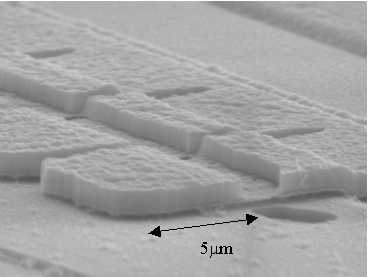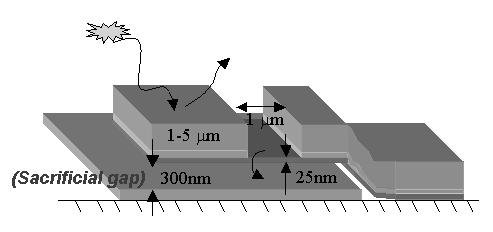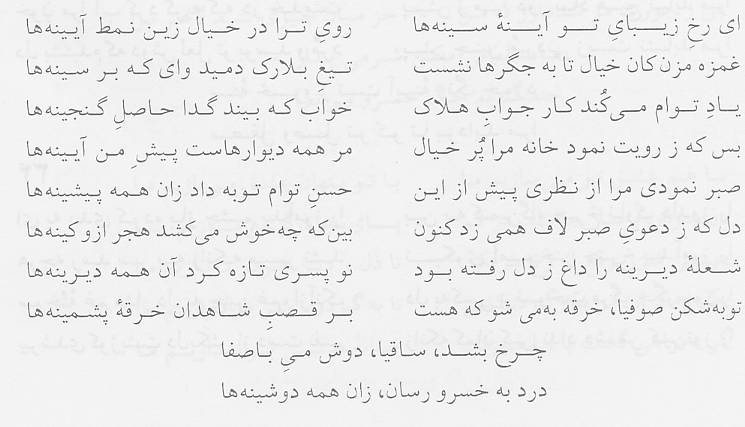
One Face, Infinite Reflections
The hearts, the mirror for the beauty of Your Face
The workings of a mirror the visualization for Your Face
Gesture not Your Face that desires might befall upon the
hearts
Like the stainless steel blade striking upon the hearts,
Wow! [1]
Remembering You is the reply for death and destruction [2]
How can a beggar ever dream about the wealth of all
treasures?
Because Your Face filled my home with so many thoughts [3]
In front of my face many mirrors hanging upon every wall
Procrastinating to show even a glimpse of Your Face so far
No wonder! Since Your beauty turned down everyone before I
The heart that boasts about patience for a moment now
Watch out! The enmity and hate Your love brings about
The heart burns no longer now that old flames are out [4]
When suddenly the smoldered past begets young fires
O! Sufi, turn away and rinse the cloak with the wine of love
[5]
Which becomes the woolen cloak over the onlookers’ silken
gown
This night, O! Cupbearer, has almost passed serve the purest
wine [6]
Bring forth the pain for Khosrow, from the resplendent
Majestic Might
End.

Man is fabricating mirrors as
small as atomic scales, in
millions placed side-by-side precise and complex designs. Each mirror
reflects a
tiny amount of light, imperceptible by human eye but millions of these
reflections coalesce into one complex integrated semiconductor device,
a
machine capable of advanced almost infinite-like operations suitable
for
variety of applications.
Just like these prefabricated
atomic scale mirrors, resides
in depth of your heart complex mirror-like visualization reflecting the
peculiar light of the Creator onto thoughts, imaginations, beliefs,
knowledge,
wisdom, love, hate and beauty… Just like semiconductor-fabricated
micromirrors,
human eye cannot see these mirrors within us. But their reflections a
major
part of our lives and our behavior.
Whether you say, “I do not
believe in God” or “I do believe
in God” in both cases the Light from the Face of the Beloved emanates
upon the
mirrors of hearts, the same light reflects the same manner but the
words chosen
by the owner of the heart to describe the event differ. Had this light
reflected not, the above two sentences never uttered even once in the
universe!
Their utterance proof for the light that has been reflected by a mirror
deep
within your darkness…
[1] No
matter when and where and what the conditions, we are
facing the Face of the Beloved (Koran[2:115]).
Its gestures are the abetment and
encouragement for hearts to say or do certain things. And in doing so
we fall
into many trials and tribulations. So the reflection of Its gesturing
face is
like a sword hitting our hearts.
[2] When
something awful happens a car crash or some very
bad news or sudden pain, even the atheist startled yells aloud “Oh my
God!”.
The poet says there is something within us that upon such emergencies
like a
mirror reflects the beam of Almighty’s console as if the Lord saying,
“I am
here call upon me”. But this happens automatically beyond our control,
for
everyone, the wordless light of the Beloved reflecting off the mirror
within
the hearts. Even though we are like the beggars in this world, no
chance of
dreaming about the wealth, still in our heart there is this constant
dream,
reflection of the most precious treasure of the Universe yes! The
Beloved.
[3] Home
is this world filled with the Face of the Beloved
Creator. No matter where we look, there is a mirror and reflecting the
light
off Its beautiful face.
[4] Just
when you think your heartache is over about one
thing, you are hit with the smoldering flames of another! This is how
the human
heart continues to be alive. And no matter what burns you, it is the
fire from
the past burnt the people before you.
[5] ‘Turn
away’ means to renounce this world. I love the
imagery to wash with the wine! ‘Onlookers’ are the people around who
are
obsessed about the material wealth and that is symbolized by the silken
gown. I
guess the poet means to wash the silk away with the wine of love, and
wear the woolen
gown instead to become Sufi which means someone wearing wool in Arabic.
During the early rise of Islam
the material wealth was
spread about the empire in vast amounts. To the point that men started
to wear
silk which has been forbidden by the Prophet for men as a symbol of
modesty.
Sufis, originally wealthy scholars, some gave away their wealth and
start
wearing the woolen cloak to protest against the silk wearers to protest
against
the materialism at large amongst the Muslims. In this verse the poet
used the
term Sufia which in Farsi means ‘O! Sufi’ it has nothing to do with the
term
Sophia which some believe is Greek for wisdom.
[6] The
Farsi word ‘Doosh’ is used once in each verse. First
it means last night but the real meaning I believe is the past life or
life as
it is being wasted. ‘Doosh’ in the second verse means the attribute of
greatness and majesty for the Beloved. The word ‘pain’ in the second
verse
means the state of loving by the Beloved in which the lover can no
longer
withstand much lack of attention to this world or heartache and feeling
of
loss. Like the painful helplessness a lover must endure, no matter how
much
pain felt, the lover thirsts for this peculiar ache.
Background: SEM view of a 5 x
5 µm2 mirror.
Please click on the picture for the research.
©
2003-2002, Dara Shayda

